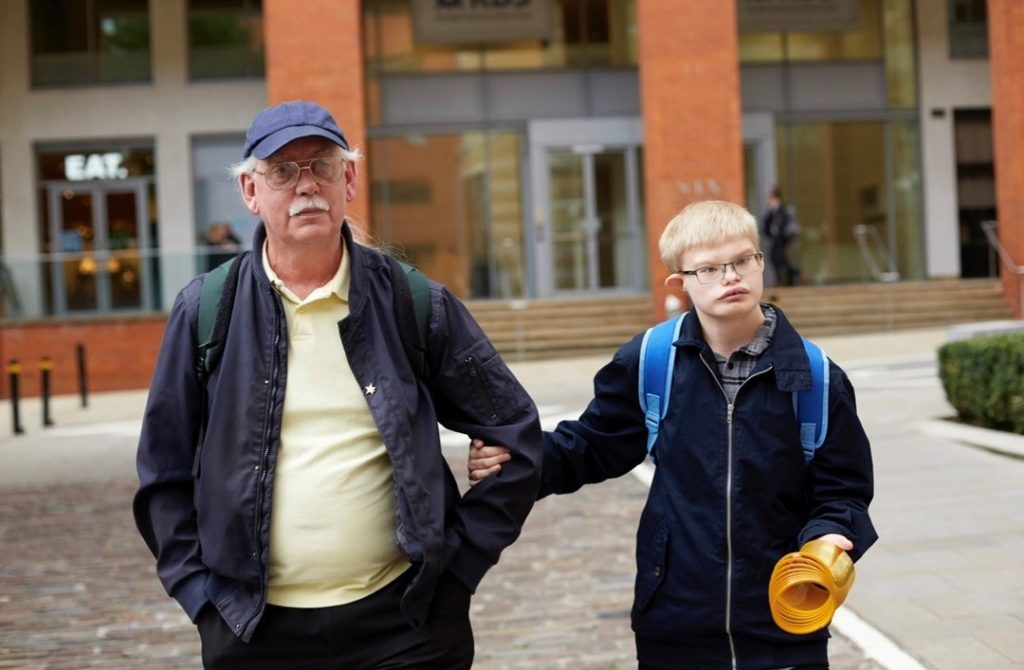Our rising electricity bills are forcing us to cut back on food and other essentials
Keith and his partner Helen live in Redditch and are full-time carers for their 21-year-old son Geordie. Geordie has CHARGE syndrome, and is deafblind and autistic. Here, Keith tells us how the cost of living crisis is affecting their family.
Visual transcript of the film
The video opens with Geordie, a young man with light blond hair and black frame glasses. He’s sitting at the desk in his room.
Next, we see Keith, Geordie’s father, speaking to camera. He’s an older man, with grey, tied back hair and silver frame glasses.
Keith: There’s no getting better for Geordie. You can’t fix atresia, there’s no operation to fix it so he’s constantly fed by machine.
Geordie’s feed machine is on the floor behind his chair. It’s attached to him via a long clear tube.
We cut to Keith preparing the feed machine in the kitchen. An electric pump passes the food mixture through the tube. We see where the machine attaches to the mains socket in Geordie’s bedroom. The plug is labelled ‘George’.
Keith: The feed is free on the NHS, of course, we don’t have to pay for that, but to deliver the feed, you need electricity all the time.
He’s now feeding at the moment and his pumps on, and it’s connected to the mains, and it will stay connected to the mains for the next seven to eight hours today.
Geordie is watching something on his iPad at home. Behind him, we see his photos and certificates on the wall – one reads ‘You’re a star!’
Keith: If I was trying to describe Geordie to somebody, I’d say he’s a star.
Geordie and Keith are getting ready to leave the house. Geordie is helping Keith to put on his cap.
Keith: He’s just so full of life and he just loves life so much and his sense of adventure is just fantastic. He’ll just try anything with a great big grin on his face, and he just loves it.
Out in the park, we see Geordie arm in arm with his dad, walking with his cane out before him.
Keith: Geordie’s feeding pump is vital to him being alive, without it, he wouldn’t be alive.
On the wall at home, we see a canvas print photograph of Geordie.
Keith: There isn’t a “can’t afford to charge the pump”, the pump comes first, and we’ll make whatever sacrifices we need to make, to make sure that the pump comes first all the time.
Keith is setting up the feed machine again, plugging it in to the kitchen mains. We see him sitting on the sofa in a dark living room, drinking a mug of tea.
Keith: It’s a concern, but there’s nothing I can do about it, but I also don’t know where it’s going to go, I can just make my plans now, to make sure we get through it as a family, to the spring.
I can’t say where we’re going to go from there, can I?
Back out on the walk, Keith signs to Geordie, suggesting that they walk home. We see Geordie at home looking out of the window.
The last shot shows the feeding machine plugged into the wall. The green light on the plug dims as the machine is switched off.
The screen fades to white. Text appears on the screen:
Families like Keith’s need more support. Act now. Sense.org.uk/CostOfLiving
The is replaced with two dots. Orange on the left and purple on the right. The dots spin around the screen then comes together in the centre, forming two hands with the letter S in the middle. This is the Sense logo. Text appears below the logo.
Sense. No one left out of life
We used to be well-off, because I had a good job, but things have really changed.
At the moment, we’re just about covering our bills, but we’re heading towards our bills overtaking our income.
These days, we have a fixed income made up of my pension and Geordie’s Universal Credit, so we have no way of taking on more hours to cope with rising costs.
We’ve really cut down what we spend on food. I often only eat twice a day to cut down on costs.
The cost of energy is hitting our family hard
One of our biggest expenses is electricity. Geordie is partially sighted. Natural lighting causes glare so we often have to have lights on more. We’re constantly using electricity.
Despite us trying to save and be careful, we don’t have a choice about the extra costs we face to support Geordie.
Keith, Geordie’s dad
Geordie is also fed through an electric pump. This has to be on charge from lunch through to the evening, every single day. You can’t miss a day, otherwise he can’t eat.

I’m worried about things getting worse later in the year. We’ve been lucky with the weather recently meaning we haven’t had to use the heating, but this will really eat into our costs come winter.
We have to be very strict and careful with the money we spend. We put the same amount into an account each month for utility bills, but in September when the energy price cap rises, this will drain away.
Despite us trying to save and be careful, we don’t have a choice about the extra costs we face to support Geordie.
The £326 cost of living payment from the government this month has gone straight into utility bills. We can’t do anything else with this money. We need to save it for autumn to help us get through. It will help make sure we can keep the lights and heating on through winter months.
I worry about how much further we’re going to have to cut things back to manage.
When you have a disabled child, everything is more expensive
As soon as you say “disability”, the price doubles. For example, if we want to go on holiday we have to find somewhere that’s accessible. That’s often double the price.
We won’t be going on holiday this year. We usually take Geordie twice during the summer but can’t do that this year.
“When new laws or policies are made, disabled people are often an afterthought. Everything is based on the non-disabled population, and disabled people are excluded from support.”
Keith, Geordie’s dad
Geordie recently had to have a new bed. It cost £3,000 because it had to come with motors and technology to lift it up and support Geordie.
Geordie is also incontinent. The Local Authority provide incontinence pads for him, but now he’s an adult, he needs more absorbent pads to keep him comfortable throughout the night. These aren’t provided so we have to pay for them out of our own pocket. This costs £36.24 for a pack of 90 and we have to buy them four times a year. So it’s nearly £150 per year.
It’s the price we have to pay to make sure he’s not left with indignity in the morning.
We deserve long-term stability
Our financial support has completely dropped over the years. Up until Geordie was 18 we received Child Tax Credits, which were £680 a month, as well as Disability Living Allowance. But now we’ve been moved onto Universal Credit which is only £234 a month.
When new laws or policies are made, disabled people are often an afterthought. Everything is based on the non-disabled population, and disabled people are excluded from support.
We need long-term changes to the benefits system for disabled people.
One-off payments are helpful. But the government needs to take it seriously and put long-term support in place that gives disabled people an equal chance at life, as everyone else has.
This month, we received a grant from Sense’s Cost of Living Support Fund, providing financial support to a thousand families living with children or adults with complex disabilities.
Even though there are bills that we could use this money on right now, we have immediately put it away to help us cope with the higher costs that will come with winter. It will help make sure we can keep the lights and heating on.
Since this blog was written, the Cost of Living Fund has now closed. We have more information about benefits and support available, or contact our Information and Advice service.

